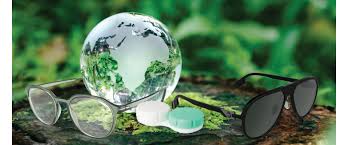Sustainable & Eco-Friendly Eyewear: A Clear Vision for a Greener Future
By Admin on September 29, 2025

In an era where sustainability is more than just a trend, the eyewear industry is undergoing a remarkable transformation. With growing awareness about environmental impact and conscious consumerism, more people are turning their attention toward eco-friendly eyewear—a stylish and smart choice that reflects both vision and values.
Why Sustainable Eyewear Matters
Let’s face it—traditional eyewear often involves plastics and chemicals that don’t sit well with Mother Nature. From petroleum-based acetate frames to non-recyclable lenses, the environmental toll can be high. Sustainable eyewear aims to change that by using biodegradable, recyclable, or upcycled materials and adopting ethical manufacturing practices.
When you choose eco-conscious glasses, you're not just upgrading your style; you're actively supporting a cleaner, healthier planet.
What Makes Eyewear Sustainable?
Sustainable eyewear isn't just about the materials. It’s a complete approach—right from sourcing to manufacturing to packaging. Here’s what truly defines green glasses:
Eco-friendly materials like bamboo, wood, cork, recycled plastics, and bio-acetate
Minimalist, waste-free manufacturing practices
Biodegradable or recyclable lenses
Plastic-free, compostable packaging
Ethical labor and fair wages in production units
Many brands now offer frames made from ocean plastics or old fishing nets. These upcycled materials not only reduce pollution but give waste a second life in the most fashionable way.
Benefits of Choosing Eco-Friendly Eyewear
You might wonder—besides the planet, what’s in it for you? Plenty, actually!
1. Unique Style
Sustainable eyewear often features earthy tones, wooden finishes, and minimalist designs that stand out from mass-produced fashion.
2. Durability
Materials like bamboo and bio-acetate are surprisingly strong and long-lasting, offering value for money.
3. Hypoallergenic
Natural materials tend to be gentler on sensitive skin, reducing the chances of irritation.
4. Environmental Impact
Every eco-friendly frame reduces plastic waste, cuts carbon emissions, and encourages greener manufacturing.
Royal Optics: Leading the Way in Green Vision
At Royal Optics, the vision goes beyond just clear sight—it’s about creating a future where fashion and sustainability walk hand in hand. The brand has embraced the eco-movement by offering a range of sustainable eyewear collections designed for the conscious customer.
Whether you're looking for bio-acetate frames, wooden temple glasses, or styles made from recycled metals, Royal Optics has something for everyone who wants to look good and do good at the same time.
The Shift in Consumer Mindset
Millennials and Gen Z aren’t just buying glasses; they’re buying into values. Modern consumers want transparency, ethical sourcing, and minimal impact on the environment. As climate concerns rise, more people are choosing brands that align with their lifestyle choices.
This shift is creating a ripple effect, pushing both small and global brands to go green. The eyewear industry is no longer just about function and fashion—it’s about making a statement.
Eco Eyewear Trends to Watch in 2025
3D-Printed Frames using biodegradable resins
Plant-based plastics replacing traditional petroleum-based frames
Recycled lens materials to reduce production waste
Buy-back and recycling programs by brands
Modular glasses that let users replace just the lens or frame part instead of discarding the whole pair
The future of eyewear is not only smart and stylish but also sustainable.
Tips for Buying Sustainable Eyewear
Look for materials: Check if frames are made from bamboo, cork, recycled metal, or bio-acetate.
Research the brand: Make sure they follow ethical practices and disclose sourcing details.
Check for certifications: Look out for FSC (Forest Stewardship Council) or recycled content verification.
Prioritize durability: Choose well-made frames that last longer and reduce waste.
Recycle old glasses: Donate or recycle your old frames rather than tossing them away.
Conclusion
Sustainable eyewear is more than a passing trend—it's a movement towards conscious fashion and responsible living. As the world embraces greener alternatives, now is the perfect time to swap your regular frames for something that reflects both your style and your values.
With visionary brands like Royal Optics leading the change in India, making an eco-friendly choice has never been easier. So, the next time you shop for eyewear, make it sustainable—and see the world with a clearer, greener lens.
FAQs
1. What materials are used in eco-friendly eyewear?
Eco-friendly eyewear is typically made from sustainable materials like bamboo, cork, recycled plastics, bio-acetate, wood, and even reclaimed metals. These materials reduce environmental harm and are often biodegradable or recyclable.
2. Are sustainable glasses as durable as regular ones?
Yes, in many cases, they’re even more durable. Materials like bio-acetate and bamboo are strong and lightweight, making them ideal for long-term use. Quality sustainable eyewear is built to last just as long—if not longer—than conventional options.
3. Is eco-friendly eyewear more expensive?
While some sustainable eyewear can be slightly more expensive due to ethical production and premium materials, the gap is closing fast. Many brands, including Royal Optics, offer affordable options that do not compromise on quality or sustainability.
4. Can I get prescription lenses in sustainable frames?
Absolutely! Most eco-friendly eyewear brands design their frames to be compatible with prescription lenses. You can enjoy both style and function while supporting a greener planet.
5. How can I dispose of my old glasses sustainably?
Instead of throwing them away, consider donating your old glasses to a local charity, recycling them through an eyewear brand’s take-back program, or giving them to someone in need. Many optical stores now support recycling initiatives.
← Back to Blog